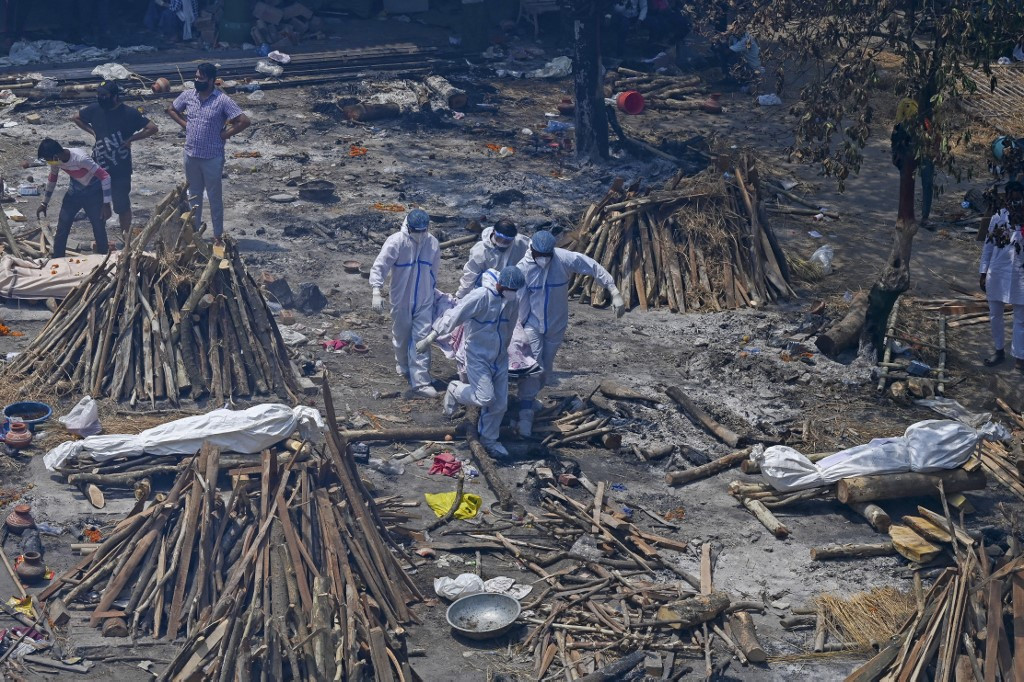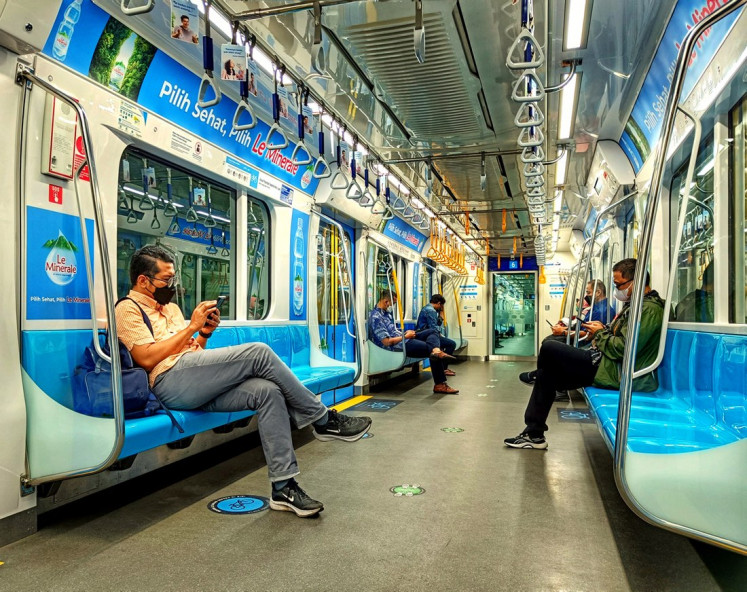Popular Reads
Top Results
Can't find what you're looking for?
View all search resultsPopular Reads
Top Results
Can't find what you're looking for?
View all search resultsIndonesia close to following India`s COVID-19 surge
Some vaccines have shown indications of reducing viral transmission but it is still too early to be sure without further scientific investigations.
Change text size
Gift Premium Articles
to Anyone
F
or the past few weeks, the world`s attention has shifted to India, where COVID-19 cases are soaring in an extreme fashion. Daily deaths have reached an all-time high. Hospitals have run out of beds. Both health workers and civilians have been left desperate.
However, Indonesia could be following a similar path. Only if we can learn from India, can we prevent a disaster from happening.
India might have celebrated too early when COVID-19 cases seemed to have been brought under control in March of this year. Health protocols were neglected on many occasions and restrictions relaxed afterward despite the threat of new COVID-19 variants, which could explain how devastating the second wave was. India`s health authorities had claimed to see an endgame in the COVID-19 pandemic.
According to the Mishra institute, only about 10 percent of the COVID-19 infections countrywide during the second wave were found to be caused by the new virus variants as reported by National Geographic. Human negligence seemingly was the major contributing factor to the chaotic second wave of the pandemic.
At least 3.5 million Indians gathered to celebrate an annual religious event, Kumbh Mela, on April 1. Later on April 29 West Bengal State and three other states held elections. We also should take into account the cricket match between India and England, which fans were allowed to watch in-person.
In such situations, proper health protocol adherence could barely be maintained. Needless to say, restrictions at public events such as weddings were relaxed while public places such as restaurants, malls and schools had been allowed to open since September 2020.
If we look carefully at those contributing human factors, public negligence with regard to health protocols and the government’s inability to establish and maintain policy reinforcements are most likely to be the driving forces of the second wave. Unfortunately, the two factors could easily be observed in Indonesia these days.
Public places such as cafés, restaurants, houses of worship, malls and even schools are reopening. More events involving crowds have been held, including a celebrity wedding that was even attended by the President, ministers and public officials. More people flock together ignoring physical distancing rules. Many people even without any sense of guilt roam around without wearing masks these days.
Most recently, mass gatherings were observed during a celebration of the city’s soccer club Persija in a tournament and shopping spree in Tanah Abang Market in Jakarta. Obviously the mandatory physical distancing did not work on either occasion, which substantially were all that happened in India.
On the other hand, despite travel restrictions ahead of Idul Fitri next week, tourist destinations remain open to the public, reflecting inconsistency in government policies. Such contradictions preceded the current deadly COVID-19 surge in India.
In regard to the Idul Fitri celebration, the government has imposed means to constrain public movement before, during and after the Islamic holiday. However, there are reasons to believe that this policy requires more effort to uphold. As the country with the world’s largest Muslim population, banning the mudik (exodus) tradition is understandably met with public resistance.
Based on the latest survey from the Transportation Ministry, at least 7 percent of respondents insist on practicing mudik. Therefore, Indonesia`s commitment and adherence to the restriction policy during the religious festival could be one of the determining factors in the effort to control COVID-19.
In this regard, India is a very good example to learn from. We should take India`s case as a serious warning that we should never take for granted. Considering Indonesia`s health facilities and resources, we most likely will also fall to our knees when we encounter the same situation.
Scientists believe every country is susceptible to a second wave of the pandemic, regardless of the existence of the new virus variant. During the first wave every country imposed physical restrictions, albeit at different levels, to contain virus transmission, which we used to know as flattening the curve.
However, imposing lockdowns or other forms of physical restrictions, possess a drawback. The stricter the physical distancing imposed the more people are protected from COVID-19 transmission. However, more people remain vulnerable to first COVID-19 infection and thus herd immunity is not well-developed.
In other words, this could lead to another COVID-19 wave when lockdowns ease, especially in Indonesia, home to over 270 million people.
Considering the recently discovered new variants in Indonesia, the second wave of COVID-19 could be harder to expect.
Despite the mass vaccination program, more issues on vaccination are yet to be solved. Some vaccines have shown indications of reducing viral transmission but it is still too early to be sure without further scientific investigations.
Thus people should also be protected from developing a false sense of security having been vaccinated. Moreover, there is no clear answer so far about for how long a vaccine can provide protection and whether or not we need a vaccine booster.
Indonesia’s vaccine coverage is still far from enough to achieve herd immunity. By the middle of April, the inoculation had covered only about 15 million people, 5.6 percent of the population. Therefore, compliance with health protocols and strong and consistent policy enforcement remain the best approach in battling the pandemic, which India failed to deliver.
In conclusion, we are not too far away from following in India`s footsteps toward a deadly COVID-19 explosion. We still have time for serious refinement. Therefore, upholding the health protocols during the pandemic is pivotal in ensuring we can reach the end of the tunnel.
***
The writer is ageneral practitioner at Elim Rantepao Hospital, North Toraja, and an LPDP Scholarship awardee for MSc in Cardiovascular Science at University College London, UK.










